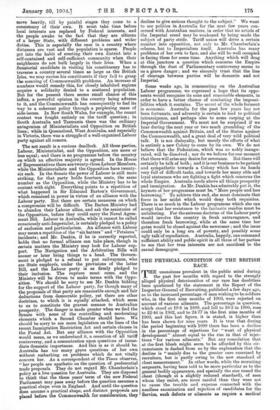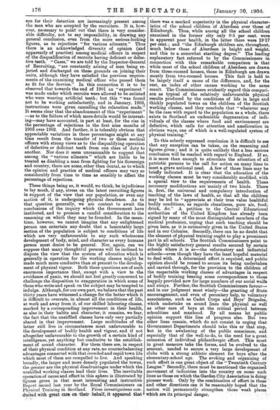THE PHYSICAL CONDITION OF THE BRITISH RACE.
THE uneasiness prevalent in the public mind during. the past few months with regard to the strongly alleged physical deterioration of our race has doubtless been quickened by the statement in the Report of the Inspector-General of Recruiting, published a few days ago, as to the increased percentage of men wishing to be soldiers who, in the first nine months of 1903, were rejected on account of various ailments. The percentage in question, which stood at 19.8 in 1899, and fell to 16.3 in 1900, rose to 22.46 in 1902, and to 24.77 in the first nine months of 1903, and this last figure, it is stated, is higher than has been shown for nine years. It is true that during the period beginning with 1899 there has been a decline in the percentage of rejections for "want of physical development" almost equal to the rise in that of rejec- tions "for various ailments." But any consolation that at the first blush might seem to be afforded by this cir- cumstance is dashed from us by the explanation that the, decline is "mainly due to the greater care exercised by recruiters, but is ipartly owing to the new standard of chest measurement." In other words, while the recruiting sergeants, having been told to be more particular as to the general bodily appearance, and specially the size round the chest (though at a slightly reduced standard), of men whom they enlist, are more careful than they were not to cause the trouble and expense connected with the needless examination and rejection of candidates for the Service, such defects or ailmenta as require a medical eye for their detection are increasingly present among the men who are accepted by the recruiters. It is, how- ever, necessary to point out that there is very consider- able difficulty, not to say impossibility, in drawing any general conclusion, even from the more serious-looking figures, as to rejections "for various ailments." Thus there is an acknowledged diversity of opinion (and apparently of practice) among medical officers in respect of the disqualification of recruits having deficient or defec- tive teeth. "Cases," we are told by the Inspector-General of Recruiting, "are constantly arising of men being re- jected and discharged on these grounds on joining their units, although they have satisfied the previous require- ments of the examining medical officer who passed them as fit for the Service." In this connection it is to be observed that towards the end of 1901 an "experiment " was made under which recruits were allowed to be enlisted who were wearing artificial teeth ; but this "was found not to be working satisfactorily, and in January, 1903, instructions were given cancelling the relaxation made." It seems clear that the abandonment of this "experiment" —as to the failure of which more details would be interest- ing—may have accounted, in part at least, for the rise in the percentage of rejections in the first nine months of 1903 over 1902. And further, it is tolerably obvious that appreciable variations in these percentages might at any time result from the transfer of two or three medical officers with strong views as to the disqualifying operation of defective or deficient teeth from one class of duty to another. Nor does it seem unreasonable to suggest that among the "various ailments" which are liable to be treated as disabling a man from fighting for his Sovereign and country, there are some, other than dental, as to which the opinion and practice of medical officers may vary so considerably from time to time as sensibly to affect the percentage of rejections.
These things being so, it would, we think, be injudicious to lay much, if any, stress on the latest recruiting figures in support of the view that our population, or even any section of it, is undergoing physical decadence. As to that question generally, we are content to await the conclusions of the inquiry which the Government have instituted, and to promise a candid consideration to the reasoning on which they may be founded. In the mean- time, however, we cannot imagine that any enlightened person can entertain any doubt that a lamentably large section of the population is subject to conditions of life which are very unfavourable to any such wholesome development of body, mind, and character as every humane person must desire to be general. Nor, again, can we suppose that many thoughtful persons will be inclined to dispute the view that the system of education which is generally in operation for the working classes might be made much more conducive than at present to the develop- ment of physical vigour. Both these questions are of such enormous importance that, except with a view to the avoidance of panic, we should not feel greatly concerned to challenge the disposition to exaggeration in which some of those who write and speak on the subject may be tempted to indulge. Although, for our own part, we believe that the past thirty years have witnessed a change for the better which it is difficult to overrate, in almost all the conditions of life, at work and away from it, of our skilled labouring classes, marked by a corresponding improvement in their health, as also in their habits and character, it remains, we fear, the fact that the unskilled classes have only very partially shared in that improvement. Large multitudes of the latter still live in circumstances most unfavourable to the development of• bodily health and vigour, and if not altogether unfavourable to the growth of a certain kind of intelligence, yet anything but conducive to the establish- ment of sound character. For them there are, in respect of their physical condition at any rate, no counterbalancing advantages connected with that crowded and rapid town life which most of them are compelled to live. And speaking broadly, the larger and more densely populated the towns, the greater are the physical disadvantages under which the unskilled working classes lead their lives. The inevitable operation of cause and effect in this sphere is illustrated by figures given in that most interesting and instructive Report issued last year by the Royal Commissioners on Physical Training in Scotland. From investigations con- dtcted with great care on -their • behalf, it appeared that there was a marked superiority in the physical character- istics of the• school children of Aberdeen over those of Edinburgh. Thus, while among all the school children examined in the former city only 0-5 per cent. were in apparent poor health, in the latter there were 19-17 per cent ; and "the Edinburgh children are, throughout, much below those of Aberdeen in height and weight, and this to a somewhat startling degree." The leading explanatory fact referred to by the Commissioners in connection with this remarkable comparison is that while most of the school children of Aberdeen are drawn from three-roomed houses, those in Edinburgh are drawn mostly from two-roomed houses. This fact is held to be largely itself a cause of the difference, and, for the rest, an index of other causes working to the same result. The Commissioners evidently regard this compari- son as typical of the relatively unfavourable physical results produced by the conditions of life in large and thickly populated towns on the children of the Scottish working classes, and they conclude that "whatever may be the case with regard to the population as a whole, there exists in Scotland an undeniable degeneration of indi- viduals of the classes where food and environment are defective, which calls for attention and amelioration in obvious ways, one of which is a well-regulated system of physical training."
To this soberly expressed conclusion it is difficult to see that any exception can be taken, on the reasoning and figures given ; and it is quite unlikely that a less serious conclusion will be reached with regard to England. If so, it is more than enough to stimulate the attention of all patriotic persons to the call for action on many lines to meet a grave national need. A few of those lines may be briefly indicated. It is clear that the education of the working classes must be very considerably modified, with a special view to the requirements of health. These necessary modifications are 'mainly of two kinds. There is, first, the universal and compulsory introduction of teaching of the laws of health, so that all the children may be led to "appreciate at their true value healthful bodily conditions, as regards cleanliness, pure air, food; drink, &c." A petition to the Central Educational authorities of the United Kingdom has already been signed by many of the most distinguished members of the medical profession, urging that such teaching should be given here, as it is extensively given in the United States and in our Colonies. Secondly, there can be no doubt that the element of physical training ought to play a prominent part in all schools. The Scottish Commissioners point to the highly satisfactory general results secured by certain schools where it is so—the reformatory and industrial schools—even though they have the least hopeful material to deal with. A determined effort is required, and public opinion should be roused to secure its being undertaken and carried through, for the provision to the children of the respectable working classes of advantages in respect of bodily training bearing some correspondence to those happily provided now for large numbers of our social waifs and strays. Further, the Scottish Commissioners favour— and in our judgment most wisely—the granting of State encouragement, and even of pecuniary help, to voluntary associations, such as Cadet Corps and Boys' Brigades, which undertake on sound lines the physical as well as other care of boys at the critical period between schooltime and manhood. By all means let public opinion support this line of progress also. But two other lines remain, which do not consist in urging that Government Departments should take this or that step, but in the awakening of the public conscience, and especially that of the well-to-do, to the need for a great extension of individual philanthropic effort. This must in great measure take the forms, and be evolved to the amount, needed to secure a very large development of clubs with a strong athletic element for boys after the elementary-school age. The evoking and organising of such effort is one great object of the "Twentieth Century League." Secondly, there must be mentioned the organised movement of industries into the country on some such lines as those on which the Garden City Association is doing pioneer work. Only by the combination of effort in these and other directions can it be reasonably hoped that the nation will permanently strengthen those• weak places which are its principal danger.























































 Previous page
Previous page